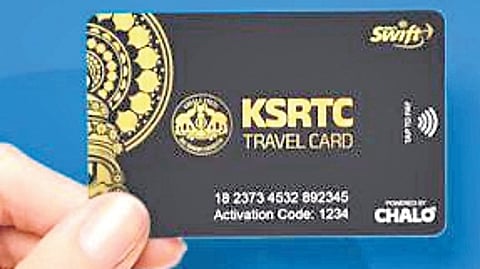

KOCHI: With the Kerala State Road Transport Corporation (KSRTC) rolling out a travel card, there are now calls from several quarters for an integrated ticketing system — on the lines of the Kochi1 card — to facilitate seamless travel across multiple modes of transport.
However, several hurdles remain in implementing services such as the National Common Mobility Card (NCMC), also known as ‘One Nation, One Card’ -- a contactless debit card developed by the National Payments Corporation of India (NPCI) and the Ministry of Housing and Urban Affairs (MoHUA) for payments across transport systems.
While the ‘Chalo’ card and app, rolled out by KSRTC, are being hailed as a solution to problems like ‘change’ (coins and smaller-denomination currency), they are part of a closed-loop payment system that doesn’t permit integration with other transport modes.
“The closed-loop system involves risk of fraud by stakeholders. BMTC (Bengaluru Metropolitan Transport Corporation) switched over from closed loop to open loop after it lost Rs 4,000 after staff of a single bus deleted ticketing data and siphoned off the amount.
The open-loop system is now increasingly being adopted the world over due to security concerns. Practically, it can’t be integrated with other modes of transport or the ONDC (Open Network for Digital Commerce),” said G P Hari, former additional general manager (urban transport), Kochi Metro Rail Ltd (KMRL). The closest the state has come to implementing a single-ticketing system was in 2018 when the Kochi1 card, introduced by KMRL, was extended to private buses in the city.
Seven private bus companies signed an agreement with KMRL for the smart cards and the facility was extended to nearly 900 buses run by Perfect Bus Metro Services, Kochi Metropolitan Transport Co-operative Society Ltd, My Metro, Muziris, Prateeksha Transport Operators Organisation Pvt Ltd, Kochi Wheelz United, and Greater Cochin Bus Transport.
“However, the initiative was wound down during the Covid lockdown when bus operators withdrew after Axis Bank put forward additional conditions. Also, there were issues like electronic ticketing machines (ETMs) developing glitches,” said Navas K M, a bus owner and member of Kochi Wheelz United.
Demand for discounts
Meanwhile, experts are advocating introducing discounts, similar to Kochi Metro, for luring more commuters to purchase travel cards, while they back up the KSRTC initiative to roll out the smartcard-based payment system.
“Unlike the highly successful Kochi1 card, used by Kochi Metro, with a 20% discount on metro and 10% on water metro rides, KSRTC’s Chalo card provides no incentives. Commuters pay money in advance when they recharge the travel card. But, the cards issued by KSRTC and private buses offer no such discounts. They should follow on the lines of the Kochi Metro,” urged Dijo Kappen, transport expert and chairman of the State Public Transport Protection Committee. KSRTC’s current limited-period offer of `40 for a `1,000 recharge or `100 for `2,000 pales in comparison.
Private bus operators, who pioneered travel cards years ago, face similar disinterest. “We had introduced travel cards way back, but currently only 10-20% of buses extend the facility,” admitted T Gopinath, general secretary of the Kerala State Bus Operators Association Co-ordination Committee. He noted a lack of enthusiasm from both crew and passengers in continuing with the cards.
Despite setbacks, experts strongly advocate the expansion of travel card services, citing their multifaceted benefits beyond just solving the ‘change’ problem.
“Using apps, one can track buses. Authorities also gain valuable data on demand routes and peak-hour traffic,” explained Dr D Dhanuraj, chairman of the Centre for Public Policy Research (CPPR), a Kochi-based think tank.
‘Chalo’ card and app hailed
While the ‘Chalo’ card and app, rolled out by KSRTC, are being hailed as a solution to problems like ‘change’ (coins and smaller-denomination currency), they are part of a closed-loop payment system that doesn’t permit integration with other transport modes.
Despite setbacks, experts strongly advocate the expansion of travel card services,